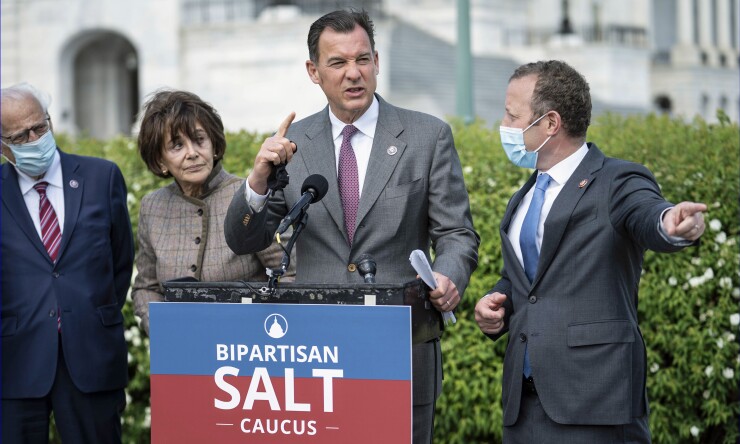An overhaul of the state and local tax deduction cap remains on the table despite fast-moving negotiations between Democrats trying to hammer out a deal on President Joe Biden’s social spending plan.
Current SALT cap proposals would: increase the size of the cap; suspend the cap for two years, reinstating it in 2024 and lifting it permanently in 2026; or suspend the cap for two years, reinstating it in 2024 and not lifting it permanently until 2028.
Under current law, the cap expires in 2025.
While the structure remains unclear, some type of relief from the cap is likely in a final reconciliation bill, according to Chris Krueger, managing director of the Washington Research Group at Cowen.
“This is how sausage is made and SALT relief has been a red line for a number of northeastern Democrats,” Krueger wrote in his Oct. 26 DC Download newsletter. Krueger called it "sunset shenanigans" and added that there's "uncertainty" about how a new Congress would tackle the issue after the two-year suspension.

The SALT overhaul is one piece of fluid negotiations among Democrats trying to craft a reconciliation bill that features several municipal market priorities, including the restoration of tax-exempt advance refundings. House Democratic leaders are also pushing for a vote this week on a $1.1 trillion bipartisan infrastructure bill. Without the vote, surface transportation programs will expire on Oct. 31, requiring another temporary extension.
As part of the Tax Cut and Jobs Act in 2017, the federal deduction for state and local taxes is capped at $10,000. For the muni market, it's important because issuers argue that the cap cramps their flexibility to raise their taxes. Lawmakers from high-tax states like New York and California, where a resident’s income and property taxes can easily surpass $10,000, have said repeatedly that a final reconciliation bill needs to bring some kind of SALT cap relief, with some holding out for a full repeal.
The Joint Committee on Taxation has projected that a full repeal of the SALT deduction would result in $88.7 billion in lost revenue in 2021. The Brookings Institution puts the cost of a two-year repeal at $85 billion a year.
SALT reform has high-profile advocates in Congress, like Senate Majority Leader Chuck Schumer and House Ways and Means Committee Chair Richard Neal, who this week said the issue remains in play. Roughly 35 lawmakers have formed a so-called SALT Caucus to push the issue.
In a statement earlier this week, New York Rep. Thomas Suozzi said after talking with top Democrats he was “confident” that SALT would be included in a final package.
“Restoration of the SALT deduction is essential for the economic health of New York and similarly situated middle class families throughout the country. No SALT, no deal.”
And New Jersey Rep. Josh Gottheimer tweeted this week that he’s “fighting tirelessly to ensure that the reconciliation bill includes a repeal of the SALT cap.”





